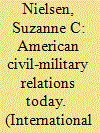| Srl | Item |
| 1 |
ID:
111918


|
|
|
|
|
| Publication |
2012.
|
| Summary/Abstract |
Fifty-five years after it was first published, Samuel Huntington's The soldier and the state remains an essential starting point for serious discussions of American civil-military relations. In part this is due to the boldness and ambition of the author. Huntington brought theory to a research area that had suffered from too little theorizing and then went on to formulate concepts that scholars and practitioners of civil-military relations still find useful. These include: the conceptualization of the military as a profession; the articulation of the two central forces shaping the nature of military institutions as the functional and the societal imperatives; and the formulation of subjective and objective control as the two main patterns of civilian control. This review article briefly revisits these concepts and argues that they retain utility in illuminating important issues in American civil-military relations today. It also argues, however, that Huntington's contributions were productive but not perfect. Some of his specific definitions, such as the content of military expertise, are debatable. Some of his central concerns, such as whether the United States could sustain a strong military over an extended period of time, are no longer central today. Finally, in some places the literature has moved beyond what Huntington offered. The best example is the ongoing debate over how the country's political leaders and its most senior military officers should interact. It is precisely on this point that Huntington's objective control is the weakest. While The soldier and the state certainly does not deserve uncritical acceptance, it does continue to merit a fair hearing. Current discussions of American civil-military relations are likely to be more reasonable and productive if Huntington is given a voice.
|
|
|
|
|
|
|
|
|
|
|
|
|
|
|
|
| 2 |
ID:
123663


|
|
|
|
|
| Publication |
2013.
|
| Summary/Abstract |
This article seeks to answer several vital questions about contemporary American civil- military relations. For example, why might the most professional military in United States history seem to be especially likely to engage in public dissent and advocacy? Why might political dissent and activity hold appeal for current and upcoming generations of military officers? And, how can present day officers be persuaded that retaining an apolitical ethos is fundamental to the American military, not just because of tradition but because public dissent can do real damage to the military institution and to the country it serves?
|
|
|
|
|
|
|
|
|
|
|
|
|
|
|
|